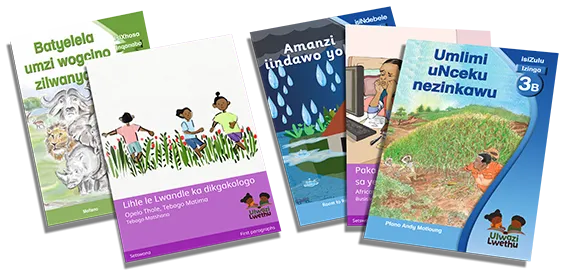Approach Image content
Unique Features

Mother Tongue Matters
Written in indigenous languages by mother tongue speakers and all adaptations carried out by mother tongue speakers.

High Quality Readers
Developed by four established NGOs with expertise in African languages and quality assured by the University of Pretoria.

Local and Relevant Content
Stories reflect the realities of South African children’s multilingual contexts and multiple experiences.

Curriculum Aligned
All materials have been developed by African Language Literacy experts in alignment with the CAPS Life Skills Curriculum themes and topics.

Cost effective
All material has been set-up to access for free to download, self-print or for bulk-printing (a Partner can assist you if you do not have your own printing supplier).

Curate your own collection
Choose from a multilingual collection of 1 430 high-quality Graded Readers and Storybooks in under-published indigenous languages.
Educational Benefits
High quality CAPS-aligned African language reading books and teacher support resources, targeted at learners in the Foundation Phase to read in their home language. Systematically helping learners with decoding, letter sounds, word recognition, reading fluency and comprehension.
Learn MoreLevelled and Decodable
Graded readers are levelled and decodable to systematically improve the reading fluency and comprehension skills of Foundation Phase learners.
- Grade R - Early Emergent
- Level 1 - Grade 1 - Emergent
- Level 2 - Grade 1 & 2 - Developing
- Level 3 - Grade 2 & 3 - Early Fluent
- Level 4 - Grade 3 - Fluent
- Level 5 - Grade 3 – Independent
Storybooks have been developed with increasing levels of difficulty starting with First Words for new readers becoming more complex up to First Paragraphs for more capable readers.
- Level 1 - First words: Single words or a short simple sentence; up to 11 words per page.
- Level 2 - First sentences: Two or three short sentences; 11–25 words per page.
- Level 3 - First paragraphs: One or two short paragraphs; 26–51 words per page.
- Level 4 - Longer paragraphs: Two or more paragraphs; 51–75 words per page.
- Level 5 - Read aloud: Fewer pictures; more than 76 words per page.
Licensing
Ulwazi Lwethu resources have been developed as Open Education Resources (OER).
More About Licensing


